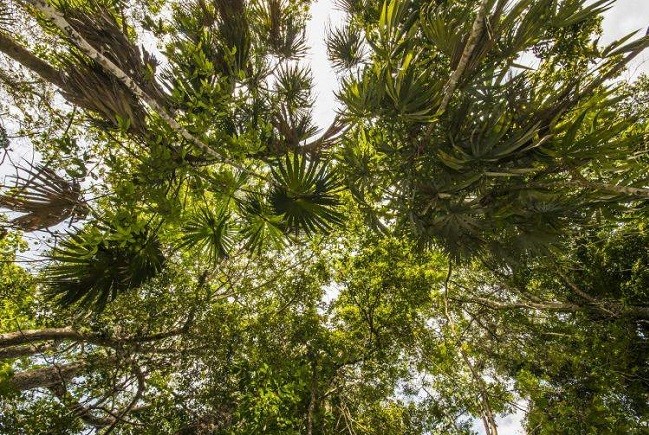A new analysis by the Rights and Resources Initiative (RRI) and scholars at McGill University shows that many tropical forested countries seeking to benefit from international forest carbon markets have yet to define in law and in practice the rights of Indigenous Peoples, local communities and Afro-descendant Peoples over carbon in their customary lands and territories.

This lack of clear rights poses substantive risks to both communities and investors, creating uncertainty as to who will benefit from carbon markets, offsets and emission reduction strategies.
Alain Frechette, Director of Strategic Analysis and Global Engagement at RRI, said, “Without adequate legal safeguards, the accelerating demand for nature-based solutions risks incentivizing land grabs and carbon capture by states and third parties – even where local peoples own the lands and forests involved. It is crucial that lawmakers and climate advocates champion the rights of forest peoples as the underlying foundation to effective, equitable and sustainable nature-based climate actions.”
The analysis looked at the status of the legal recognition of the rights of Indigenous Peoples, local communities, and Afro-descendant Peoples to the carbon in their lands and territories across 31 countries in Africa, Asia, and Latin America. Together, these countries hold almost 70 percent of the world’s tropical forests, including the five countries with the earth’s most tropical forests: Brazil, DRC, Indonesia, Peru, and Colombia. The 31 countries represent at least 62% of total feasible natural climate solution potential – and the bulk of carbon offset opportunities.
Each country was evaluated on its preparation for the establishment of carbon markets, which would allow it to sell carbon credits – tradeable units that have been measured and accounted for under a baseline-and-credit system and which governments and companies can buy to meet emission reduction obligations. The findings show that overall, few of the 31 countries explicitly recognize community carbon rights, and even fewer have tested the operational and political feasibility of established rules.
Key findings from the research include:
- Only three of the 31 countries studied explicitly recognise community rights to carbon on lands owned by or designated for communities (Ethiopia, Peru, Republic of the Congo).
- Just three countries (Brazil, Colombia, Costa Rica) tie carbon rights to various types of land or forest ownership (including lands legally owned by Indigenous Peoples, local communities, and Afro-descendant Peoples), establishing their ownership of the carbon in their lands.
- Only five countries (Costa Rica, Indonesia, Mexico, Philippines, and Vietnam) have mechanisms that define how carbon and non-carbon benefits will be shared as required by jurisdictional REDD+ approaches. Only one of these (Vietnam) was verified as being partially operational.
- 19 of the 31 countries have feedback and grievance redress mechanisms to support engagement in REDD+, protect communities, and ensure fair and transparent transactions. Of these, only Costa Rica and Mexico have operationalised these mechanisms.
As some of the world’s most powerful actors aim to rapidly expand the global carbon market, nature-based solutions are attracting major public and private investment. Carbon offsets and emission reduction and removal schemes are taking shape through voluntary market initiatives, results-based payments agreements and dedicated climate financing. An ambitious public private coalition, LEAF, joined by top companies like Amazon, Bayer, Nestle and Unilever, have set an initial goal of mobilizing at least $1 billion for jurisdictional REDD+ credits issued by the Architecture for REDD+ Transactions (ART).
Customary lands held, managed and stewarded by Indigenous Peoples and local communities cover almost half the Earth’s area, and deforestation rates on these lands have been recorded as lower than on lands managed by other actors. Yet, most of them have yet to be legally recognized by governments. Even where land rights are legally acknowledged, community rights to carbon and tradeable emission reductions remain uncertain and vulnerable to interpretation.
The analysis further found that while a handful of countries have established frameworks to regulate carbon linked transactions, the vast majority have only partially or inadequately defined them, indicating that the majority of the countries assessed are ill-prepared to engage in forest carbon transactions.
“There is a real risk that neither the people nor the planet will benefit from carbon transactions if the issue of carbon rights is left unresolved,” said Sébastien Jodoin, co-author and McGill University’s Canada Research Chair in Human Rights, Health and the Environment. “These initiatives are set up to fund governments that don’t have a good track record for stewarding such funds or respecting the rights of forest communities.”
Representatives of Indigenous, local community and Afro-descendant organisations noted the analysis underscores the risks of expanding carbon markets without first securing their land rights.
“The commitment to protecting forests and climate at the international level is welcome, but it cannot be done without the Indigenous Peoples who have historic rights over half of the world’s tropical forests,” said Fany Kuiru Castro, Coordinator for Youth, Women and Family and legal professional with the National Organisation of Indigenous Peoples of the Colombian Amazon (OPIAC). “We have protected the Amazon and other ecosystems that are vital to humanity for generations, and our rights can no longer be ignored.”
